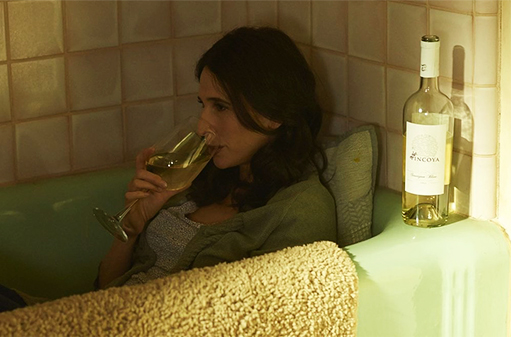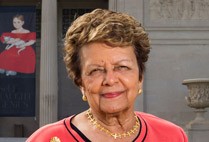Valerie, a psychiatrist played by Michaela Watkins on the popular Hulu series Casual, notices a gigantic bouquet of flowers on the desk of Leia, her receptionist, played by Julie Berman. She picks up the accompanying card, reads it, and her face drops.
“Who are they from?” asks Leia.
“Harry. That’s so nice.”
“Not necessarily,” says Leia. “My sister dated a plastic surgeon who sent her flowers and two weeks later he died.”
At that moment, Valerie’s therapist partner, Jennifer, played by Katie Aselton, spots the flowers.
“Oh. Look at those!”
“Yeah,” says Valerie, flatly.
The shot ends, and show creator Zander Lehmann bounds from his perch behind a monitor to the set, asking Aselton to put a bit more emphasis on the “Oh.”
The scene—short, quirky, devoid of closure—is classic Casual, which was nominated last year for a Golden Globe for Best TV Comedy. The dialogue is kind of funny and it’s also kind of disturbing. And while it no doubt makes some viewers uncomfortable, its avoidance of the predictable lines of standard network fare makes Watkins (CFA’94) feel liberated.
“It’s my kind of storytelling,” she says. “You don’t come out and say, ‘Hey! Here’s the story. Here’s the problem: he’s like this, she’s like that, uh-oh, how are they ever going to make it?’ It’s just layer and layer and layer, and all of a sudden in the later part of the series everything goes crazy.”
Casual is Watkins’ first shot at center stage, and it comes after 15 years of supporting roles on shows like New Girl, Hung, Transparent, Enlightened, Trophy Wife, and Wet Hot American Summer, as well as a season on Saturday Night Live. There was also Benched, a season-long USA Network comedy that she created with Damon Jones, like Watkins, a former member of the famous Groundlings improv company, and more than a dozen films, including The Back-up Plan, with Jennifer Lopez, Thanks for Sharing, with Mark Ruffalo, Jill Soloway’s Afternoon Delight, and They Came Together, with Paul Rudd and Amy Poehler.
Juno and Up in the Air director Jason Reitman is the executive producer of Casual, which began its second season in June. Watkins, who Vanity Fair calls “one of the most prolific scene-stealing actresses in comedy,” plays a therapist in the process of divorce and the mother of a precocious teenage daughter, played by Tara Lynne Barr.
“For an actress,” says Watkins, during a break in filming season two’s seventh episode, “it’s a chance to fire on every cylinder. Nobody is put in a two-dimensional part.” She picks at salad, sitting beside the artificial greenery in the fake backyard of the two-story house that on the show she shares with her daughter and her brother, Alex, played by Tommy Dewey. The siblings careen through an odd relationship, too intimate and a tad too dependent. Alex’s cofounding of an online dating service has brought him a comfortable lifestyle, but has done little for his emotional well-being, long damaged, like Valerie’s, by a dysfunctional upbringing.
Watkins sees the nuanced dramedy, which is shot in an enormous Hulu studio 20 miles north of Hollywood, as the kind of fruit that could flourish only in a field cleared of the debris of network demands and seeded with the sensibility of a new school of women directors. “Streaming technology has enabled a platform in which the creative has control,” she says. “The way they used to do things was based on a Nielsen box. If you didn’t come back to watch the show—not even week to week, but after you took a bathroom break—the network deemed that your show was not holding people’s attention, and in order to get their attention, they would tweak the creative.

TV Guide says Watkins best work puts her character Valerie’s vulnerability on full display.
Image courtesy of Dale Robinette/Hulu
“They would say, ‘We can’t have a story that continues, because if viewers come back they’re going to be lost, and they’re going to drop off the show.’ So you didn’t have interesting story lines, or you would need to give this character something because ratings show that people liked that. The creative would get tweaked, the vision would get tweaked, and it was no longer the creators having their voice. On the other hand, with a subscription-based service, it doesn’t matter on a week-to-week algorithm if people are leaving after they go to the bathroom. Because everything is on demand, there is this collective understanding that nobody watches things as soon as they come out. Nobody does. And now you can really get involved in the story lines. People can really invest in the original vision, the thing that sparked it and was the nexus of what was interesting can carry through the entire season, and for me, it’s much more gratifying to watch.”
Vanity Fair has admired the show’s “relaxed timing,” which makes Casual feel more like an indie film broken up into chapters than a drama series. Rotten Tomatoes rated it the fourth best fall 2015 TV premiere and gave it an impressive numerical grade of 93. And according to TV Guide, it’s “the best comedy of the fall TV season” and “offers a more realistic depiction of modern dating than any other show out there.” The magazine says Watkins’ “best work is in the scenes in which Valerie’s vulnerability is on full display.” The sex, which is abundant, doesn’t seem gratuitous, but “rather like an accurate portrayal of how people speak, and screw.”
New Version of Feminism
Watkins believes the genuineness of the largely female show has a lot to do with the fact that half of the episodes of Casual’s first season were directed by women, among them Diary of a Teenage Girl writer and director Marielle Heller and Lynne Shelton, who directed Your Sister’s Sister.
“I think there’s a new version of feminism, where women are saying, ‘I’m doing it like a woman,’” says Watkins. “As Transparent creator Jill Soloway says, she shoots from her vagina. And she makes the camera crew shoot from their vagina, and they’re mostly men. And you know who’s crying at the end of the taping of Transparent? Our DP. The man who’s holding the camera.”
On Casual and elsewhere, Watkins has worked with some of Hollywood’s most influential women directors, playing Hilary in Nicole Holofcener’s Enough Said and Jennie in Soloway’s Afternoon Delight and appearing in several episodes of Soloway’s award-winning Transparent.
“It’s about writing women as all their parts, the ugly parts, the good parts, the scary parts, the competitive parts…. That’s how women really are, and you’ve never seen that before.”
Michaela Watkins
“I definitely feel lucky to have resonated with these women,” Watkins says. “It’s almost like there is a language we speak together. It’s about writing women as all their parts, the ugly parts, the good parts, the scary parts, the competitive parts. You’re getting to act like these voices that you don’t normally see and hear, and it is so exciting to play; it’s like you’re using all parts of yourself. I mean, you wake up some days and you’re an extrovert, you wake up some days and you’re a shut-in, you wake up some days and you’re terrified, and you wake up some days and you’re emboldened. That’s how women really are, and you’ve never seen that before.”
Watkins certainly didn’t see it five years ago when she was shopping her creation, Benched, about a female corporate attorney who fails to make partner and finds her new job as public defender to be surprisingly rewarding. “I sat with a lot of men in the business who said, ‘Nobody is interested in watching female-driven shows,’” she says. “I grit my teeth and scraped my nails on the palm of my hand, but I didn’t say anything, because that’s the garbage that we’d been hearing.”
The long road to stardom began for Watkins with a childhood in Syracuse, N.Y., where her father was a university mathematician and her mother taught Latin. When she was eight, her parents divorced, and she moved with her mother to Wellesley, Mass. There, a gentle motherly push landed her at a tryout for a role in a local theater company’s production of the British farce See How They Run. The next thing she knew, she was Ida the maid, and she was smitten with the theater.
She arrived at the College of Fine Arts in 1990, where, she says in retrospect, “10 more years of life experience” would have better prepared her to get the most from BU. “I wish I could go to that program now.”

Michaela Watkins (left) plays a newly single therapist on Hulu’s Casual. Katie Aselton, who attended the College of Communication, plays a professional colleague.
Photo by Greg Lewis
These days, she says, the most enjoyable benefit from her BU years is the friendships sealed on stage. “When you go through something as rigorous as the theater program, it’s like these people are your war buddies. Whatever you end up doing in life, you have that shared experience for four years, and it culminates in friendships that are sustained. I still have so many friends from that program.”
After graduation, Watkins spent a year spinning her wheels in New York, then took a road trip to Portland, Ore., where she did find acting work, five years’ worth, before moving to Los Angeles. There she snagged her first role, on Charmed, and more important, earned a coveted spot with the Groundlings, whose alums include Will Ferrell, Conan O’Brien, and Lisa Kudrow.
In 2008, Watkins got the call every improv actor dreams about. Saturday Night Live executive producer Lorne Michaels thought she might be a good fit for the sketch comedy show—she was on the plane to New York within hours. She was famous for impersonations of Arianna Huffington and for her original character, iced-coffee-addicted gossip blogger Angie Tempura. But soon, before the start of the 2009–2010 season, she was let go.
The Midpoint between Sadness and Humor
To date, says Watkins, her role on Casual is the most rewarding opportunity she’s had. “It’s this combo platter of great creator and great writing,” she says. “Jason Reitman is the real deal. He’s so knowledgeable about film. He’s one of those directors who can connect emotionally to what’s on the page. He is a great writer, he’s great with character and story, and technically, he knows every single thing that is happening on a set. He’s behind the camera, he’s up on a ladder. He’s doing it all, so you feel like you’re in great hands.”
Show creator Lehmann attributes much of its success to Watkins’ talents. “She brings a certain vulnerability,” he says. “And she can find the humor in something that isn’t really that funny. It’s an ability to find the midpoint between sadness and humor, which is really right where the show lives.”
Lehmann says Aselton, who attended COM for two years before moving to LA, and Watkins, friends in real life, play off each other perfectly. Aselton has earned many movie credits and has had regular roles on Togetherness, Animals, and The League. She says her onscreen interaction with her friend is a natural product of Watkins’ personality.
“Michaela is so openly human at all times that you can easily connect with her,” says Aselton. “She brings you into her moment.”
She says that Watkins is perfectly cast for a show like Casual, one that “examines human relationships without trying to impose an agenda.” The show “looks at a couple of flawed people to see how they exist with each other. It looks at a bond between siblings and lets characters be fucked-up and weird.”
Dewey plays Watkins’ sibling and is best known for his lead role in Code Black. He is constantly impressed with Watkins’ “presentness—a highfalutin way of saying she’s very open and generous as an actor,” he says. “She is very adaptable and loose. That may come from her work in improv. I sometimes feel that when she and I are having a good day, we seem to find the same wavelength and just surf it together.”
Watkins, whose current favorite shows include Togetherness and Girls, will probably give writing another try, but it will be a screenplay, not a series.
“I can’t say that writing Benched gave me a lot of joy,” she says. “It’s so much pressure and there is no end. I need to see where the end is.”
The Casual star says she doesn’t spend a lot of time plotting career moves. Instead, she tries to follow the advice of Cheryl Strayed, author of Wild: From Lost to Found on the Pacific Crest Trail. “She was giving advice to herself as if she were 21,” Watkins recalls. “She says, ‘Don’t worry about what you wrote and what you did, because everything you write and everything you fail at is all part of your becoming.’ For me this feels like it’s all part of that. It doesn’t feel like a destination.”
Una Hora Por Favora is a short film written and directed by Jill Soloway, and starring Michaela Watkins.
















































Related Stories
Women and Gender Bias in Post-#MeToo Hollywood
Los Angeles event with BU alums sparks discussion about women in media
Sargent Alums Chosen as Patriots Cheerleaders
Two Terriers juggle very busy schedules
Jeffrey Mossa (CFA’93) Earns Emmy Nod for American Horror Story: Cult
One of seven alums nominated for TV’s highest honor
Post Your Comment